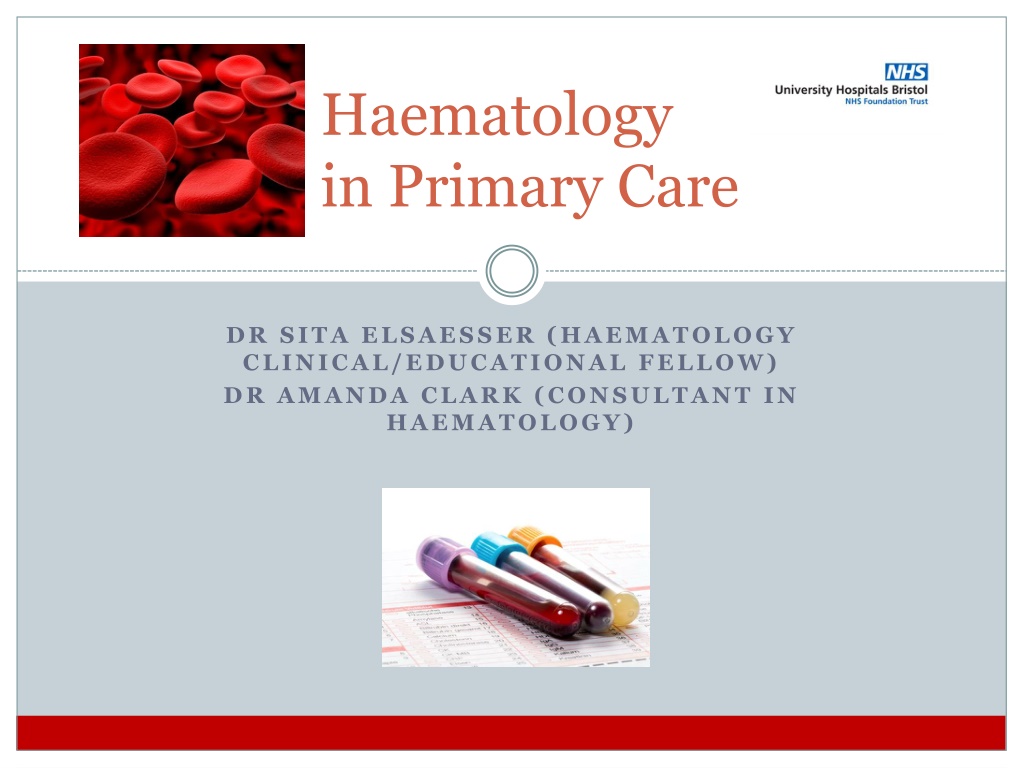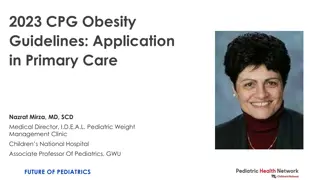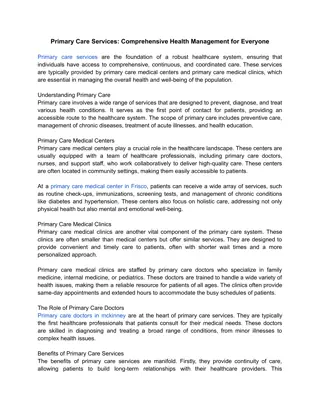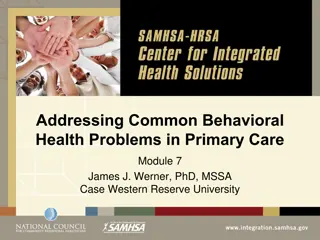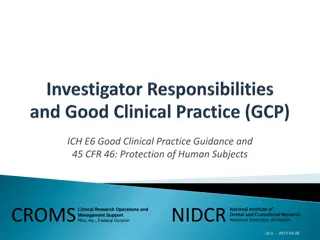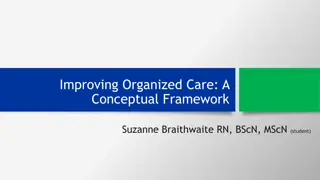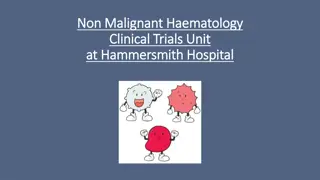Haematology in Primary Care - Clinical Insights and Guidelines
Explore key topics in haematology such as leucopenia, B12 deficiency, and myelodysplastic syndrome with detailed guidance on interpreting full blood counts, red flags, investigations, and management strategies. Learn about special situations like B12 deficiency in pregnancy and malabsorption issues. Gain insights from experts Dr. Sita Elsaesser and Dr. Amanda Clark in primary care haematology practice.
Download Presentation

Please find below an Image/Link to download the presentation.
The content on the website is provided AS IS for your information and personal use only. It may not be sold, licensed, or shared on other websites without obtaining consent from the author. Download presentation by click this link. If you encounter any issues during the download, it is possible that the publisher has removed the file from their server.
E N D
Presentation Transcript
Haematology in Primary Care DR SITA ELSAESSER (HAEMATOLOGY CLINICAL/EDUCATIONAL FELLOW) DR AMANDA CLARK (CONSULTANT IN HAEMATOLOGY)
Topics Questions and cases will be covered within each Leucopenia/ neutropenia B12/Anaemia Platelets
Interpreting a Full Blood Count Normal Range White cell count 4 11 x 109/L RBC 4.5-6.0 x 1012/L Haemoglobin 130-170 g/L Haematocrit 0.4 -0.52 L/L MCV 83 100 fL MCH 27-32 pg MCHC 310-350 g/L Platelets 150-450 x 109/L Neutrophils 1.5-8 x 109/L Lymphocytes 1-4 x 109/L Monocytes 0.2 -1 x 109/L Eosinophils 0.0 0.5 x 109/L Basophils 0.0 0.2 x 109/L
B12 deficiency Excess alcohol Liver disease Medications B12/Folate deficiency Reticulocytosis Macrocytosis Pregnancy Myelodysplastic syndrome Monoclonal protein Hypothyroidism (rare)
Red Flags & Investigations Red Flags Suspected myelodysplastic syndrome (based on blood film report) Other primary haematological cause suspected MCV > 100fl with accompanying cytopaenia (excluding in B12 / folate deficiency) Persistent unexplained MCV > 105fl Investigations in Primary Care Alcohol history and appropriate lifestyle modification B12 and folate levels (consider sequential Intrinsic Factor antibodies and coeliac screen) Blood film examination and reticulocyte count Liver and thyroid function tests Immunoglobulins and protein electrophoresis.
B12 deficiency Vitamin B12 level Action B12 deficiency likely < 150 ng/l Possible B12 deficiency. Consider repeat in 1-2 months. 150-200 ng/l B12 stores normal. Stores adequate for at least 2 years > 200 ng/l Anti-intrinsic factor antibodies: test regardless of vitamin B12 level if pernicious anaemia is suspected. Trial of vitamin B12 if clinical suspicion but indeterminate vitamin B12 levels: Patient wellbeing improves after a couple of days Increased reticulocyte count at 1 week with a normalizing full blood count at 8 weeks Neurology improves after 6-12 weeks.
Special Situations Pregnancy: Vitamin B12 testing should be avoided in pregnancy as results are unreliable Oral contraceptive pill Food-B12 malabsorption (e.g. metformin): only test if strong clinical suspicion. Trial of oral cyanocobalamin could be considered and reviewed at 6 months. Can use diet measures
High B12 This is often a non-pathological finding and rarely due to a haematological condition. Vitamin B12 may be elevated in haematological malignancy including myeloproliferative disorders
Discussion Questions Cases
Anaemia <130g/l Hb in an adult male <120g/l Hb in an adult female RED FLAGS Blood film report suggests primary haematological disorder Thrombocytopenia or neutropenia Splenomegaly or lymphadenopathy Reticulocytosis (without obvious bleeding) Unexplained, progressive, symptomatic anaemia An M protein, abnormal serum free light chain assay or positive urine light chains (Bence Jones protein)
Investigations in Primary Care Microcytic Ferritin CRP iron studies for transferrin saturation or ZPP +/- reticulocyte count for Ret Hb Normocytic Vitamin B12, folate, ferritin, renal function, liver function tests, reticulocyte, CRP. Macrocytic Review medical history Assess vitamin B12*, liver function tests, reticulocyte count blood film. Consider assessment of blood film, serum protein electrophoresis. Consider assessment of serum protein electrophoresis, GGT, LDH, TSH Consider Hb electrophoresis *not reliable in pregnancy or COCP
Inappropriate Referrals Haematology referral is unlikely to be suitable for: Elderly/frail patients with mild (Hb >100g/l), unexplained asymptomatic anaemia Clinical Haematology referral is not appropriate for: Iron deficiency anaemia B12 or folate deficiency can be managed according to BNF guidance in the community Patients with anaemia of chronic disease or renal failure consider referral to the relevant specialist team.
Discussion Questions Cases
Platelets - Thrombocythaemia Causes Investigations Infection Inflammation Iron deficiency Surgery, trauma or blood loss Primary myelodysplastic disorder (e.g. essential thrombocythaemia) Blood film Ferritin CRP Consider JAK2 if no reactive cause RED FLAGS: Arterial/venous thrombosis, neurological symptoms, abnormal bleeding
Cancer likelihood relative to platelet count Females Males Bailey, S.E., Ukoumunne, O.C., Shephard, E.A. and Hamilton, W., 2017. Clinical relevance of thrombocytosis in primary care: a prospective cohort study of cancer incidence using English electronic medical records and cancer registry data. Br J Gen Pract, 67(659), pp.e405-e413.
Referral Platelet count 600-1000x109/l in associated with: recent arterial/venous thrombosis (incl. DVT, PE, CVA, TIA, MI/unstable angina, PVD), neurological symptoms, abnormal bleeding, > 60 years Persistent (> 3months) unexplained platelet count > 450x109/l Platelet count > 1000x109/l Urgent OP assessment Refer for specialist opinion Refer for OP assessment
Discussion Questions Cases
Thrombocytopenia Causes Investigations Immune Drugs Acute or chronic infections Marrow dysfunction Liver disease Hypersplenism Haematinic deficiency Microangiopathic haemolysis Pregnancy specific Repeat FBC and blood film Renal, liver function & LDH If bruising/bleeding PT/PTT/fibrinogen Consider discontinuing precipitating medication RED FLAGS: Bleeding, splenomegaly, lymphadenopathy, pregnancy, upcoming surgery
Referral Platelet count < 50 x109/l (confirmed on repeat testing). Platelet count 50-100x109 /l in association with: other cytopenias (Hb <100 g/l, neutrophils < 1x109/l), Splenomegaly Lymphadenopathy Pregnancy upcoming surgery Persistent unexplained platelets < 100x109/l, Thrombocytpenia in patients with history of thrombosis Platelet count < 20 or bleeding or red cell fragments or blasts on film Platelet clumping on film. Urgent no referral necessary if count > 100x109/l on citrate sample. discussion with on call haematology SPR/consultant Refer for specialist opinion Refer for prompt OP assessment
Discussion Questions Cases
Neutropenia Causes Investigations Transient viral infections Persistent: Benign ethnic neutropenia, autoimmune Splenomegaly Drug related Haematological disorders Blood film Thorough history RED FLAGS: Neutrophil count < 1 Fever
Referral Neutrophils 1-1.5x109/l Neutrophils < 1x109/L Patient well: Review medications, & inform patient to report promptly if fever. Repeat FBC with blood film in 48 hours and again in 2 weeks. If persists -> refer to haematology Other blood count abnormality present and persistent on 2 occasions at least 6 weeks apart or patient unwell refer to or discuss with haematology Well with otherwise normal FBC repeat blood film at 6 weeks. REFER to haematology if: progressive/symptomatic severe or DISCUSS with haematologist If persistent but stable Patient unwell/febrile URGENT ADMISSION If ethnic neutropenia suspected: confirm with repeat FBC and confirm normal morphology with blood film. No need to refer unless diagnostic uncertainty.
Lymphopenia Assessment in primary care Any symptoms suggestive of primary immunodeficiency (e.g. recurrent infection particularly respiratory, combined with autoimmune disorders) Any implicated medications or excess alcohol? Symptoms or signs of systemic illness (e.g. infection, autoimmune disease, malignancy, malnutrition)? Symptoms or signs of a lymphoproliferative disorder? Red Flags Suspected lymphoproliferative disorder (i.e. other abnormalities on FBC, B symptoms, splenomegaly)
Who to refer Infants and children with persistent lymphopenia -> immunologist Symptomatic patients -> relevant specialist on the basis of the aforementioned investigations Only refer to haematology if a lymphoproliferative disorder is suspected.
Investigations in Primary Care Investigations in Primary Care Elderly, asymptomatic patients with a lymphocyte count >0.5 do not require further investigation Other patients: Repeat FBC and film in 6 weeks to confirm persistence Renal and liver function Consider HIV, hepatitis B and C serology Consider autoantibody screen depending on symptoms Serum immunoglobulins Asymptomatic, well patients with an isolated lymphopenia and no abnormalities on the investigations above do not necessarily need referral. Consider repeat FBC and film in 6 months.
Discussion Questions? Cases?
References UHB haematology guidelines: https://remedy.bristolccg.nhs.uk/adults/haematolo gy/guidelines-for-primary-care/
